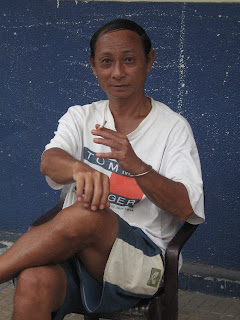I like rituals - not routine but rituals. Sometimes a regular pattern serves as a ritual but it's a pattern with a purpose. In Vietnam our alarm goes off at 5am, we're out the door on our way to the gym at 5:45, walk in the morning heat to the espresso bar at 7 and on to the office at 8. It's not exactly the Holy Eucharist but it is a pattern that serves a purpose. It gets us organized and moving, helps us stay healthy, and while we sip our lattes we have some personal one-on-one time. At the end of the day, if there is not an event to attend, we go out to dinner. We almost never eat at home when we're in Vietnam. Latte's in the morning and dinner in the evening are the bookends that frame our days in Saigon.
In the States the pattern is much different. Latte's in the morning, yes. Dinner in the evening, yes. But, for the most part both meals take place at home. There is a completely different vibe that goes with them. At home, I make the coffee drinks, grab the papers, and we settle in the living room with our respective newspapers. I have the NY Times and Marilynn has the local rag. It's parallel play. At home the gym workout comes at the end of the day and dinner comes after, later than recommended and tired to boot. I think of Vietnam as ritual and home as routine. There is something to be said for eating out.
Eating out is not about the food, although we are both very interested in good food and its preparation. Eating out, at its best, is an event. It involves choices. What kind of food sounds good? What atmosphere do we want? Sports bar, bistro, ethnic, large, small, crowded, intimate? What's the right price point? Bargain or splurge? What's the other clientele likely to be? Young, old, hip, conservative, dressed up or tattered jeans? When we eat at home the choices are limited; it's about the food and how much energy we have to prepare it.
Last weekend we went out. What is really hip these days is a small place with hardly any signage, preferably in an old warehouse, loft or garage, with a polished cement floor, exposed brick walls and an open kitchen. The wait staff wears True Religion jeans and black T-shirts, and the men all have ponytails or shaved heads. It's cosmically chic to be seen there. Of course, we had to go.
The place is called Sitka & Spruce - homage to the Northwest. For several years it was located in a strip mall and was so small that it was almost impossible to get a seat at the communal table. There is something perversely appealing about a place that is so exclusive you can't ever get in. Of course, they didn't take reservations. That would spoil the vibe.
The new location is bigger. This time we managed to get in, but we were seated side by side on stools at a long shelf that runs the length of the restaurant. The good news is that there was a window also running the length and overlooking the alley below. Let there be light. At least we were in. That turned out to be the best part of the evening. It was 15 minutes before the black T-shirt and ponytail came by with menus, and the menus themselves offered only a few "small plates," one of the other tragically hip elements of trendy restaurants these days. Nevertheless, we ordered: she chose a simple garden greens salad and I ordered chicken liver pate on a baguette. We both ordered BIG glasses of wine, and it was a good thing we did. It was another half hour before the $16 salad of bare greenleaf lettuce, lightly dressed and too salty, arrived followed 15 minutes later by my baguette with charred edges.
When we have a bad restaurant experience we always replay a set piece. Marilynn starts by pointing out the obvious shortcomings, then I chime in and start defending the staff. They're really busy. We were the last to come in. The kitchen is backed up. The waiter is trying. Don't complain; it will only make things worse and besides the waiter can't do anything about it. Blah, Blah, Blah. As an ex-restaurant owner I have sympathy for the people on the other side. But - I need to get over it. This was bad service, marginal food, and an interminable wait for two entrees served 15 minutes apart. Did they have to kill the chickens, mince the livers, and mix the terrine in the kitchen while we watched the goings on in the alley? What other explanation could there be for an hour-long wait for pate?
We are suckers for trendy new restaurants, but I hate to waste my money when they don't deliver. We'll never go back to Sitka & Spruce. We'll keep trying the new places because they usually deserve the good hype, at least for awhile. The sad part here is that we go out to have a special intimate social experience. Food is the excuse, but these outings, unlike a play or a movie, are interactive. We go out to share ourselves with each other over a meal. Good restaurateurs know this and work hard to facilitate the experience. I feel cheated when I go home disappointed or angry. But, it's a little like love - you keep on looking until you find it.





















